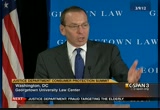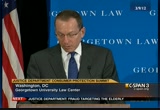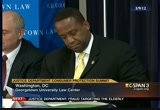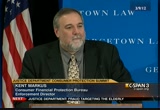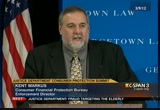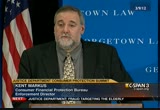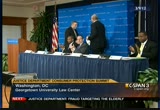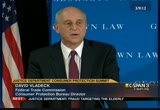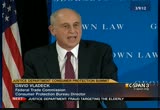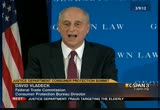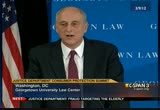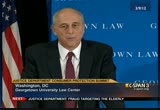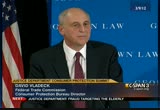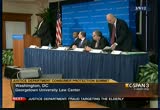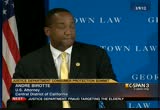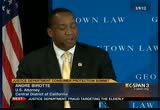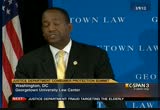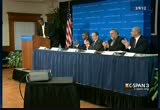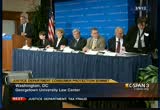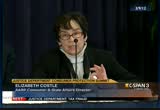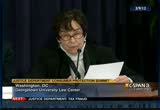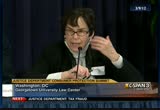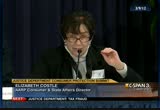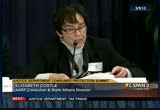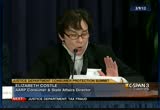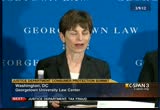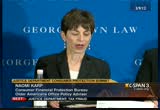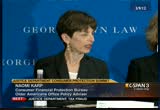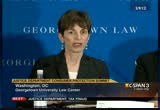tv [untitled] March 21, 2012 10:30pm-11:00pm EDT
10:30 pm
partner with was in dealing with identity theft and identity fraud. and many of the kind of scams we are all here to talk about. jonathan rush, some one from my office its here. and one of the areas we of course identify is with the relief fraud. since katrina, we learned unfortunately that americans and others have huge hearts. so when people call up and say, look, i am raising money because of this calamity. could you just donate money. people do. so we created at lsu, a comprehensive approach where we have agents from all different law enforcement entities and prosecutors and hot lines. and it's worked. we haven't eradicated disaster relief fraud. e t we have prosecuted many, ceived high sentences. we have educated people. and just this week -- and last week with the tornados that ravaged part of the united states, we started a new educational campaign.
10:31 pm
that's what we are going to do, keep learning trying to do more and more. going to try to educate those most vulnerable. some times in these crimes, we know people are embarrassed that they were scammed. maybe they were embarrassed because nay -- because they donated money or gave money because they thought that their lich life's partner they never met. thought was their kindred spirit neededan elderly person that is defrauded, gave money and it was farther from that. we hatch to together, figure how we can help our most vulnerable. we in the criminal division have identified these boiler rooms in costa rica. criminals from the united states and other places go. literally 24 hours a day they man phones with one kind of consumer fraud after another. you have won the lottery. send this much money. a relative has suffered a
10:32 pm
disaster. send us this much money. but we have extradited the people, one was sentenced to 30 years in jail. a whole group of others were sentenced to between 4 and 10 years in jail. as the attorney general said, prison has to be a component. and then last year in our partnership, such as with the terrific u.s. attorney from the central district. we took down a group, armenian power. an organized crime group. an organized gang. they are a violent gang. but they also engage in identity theft and consumer fraud. and through sthar schemetheir s after them and are prosecuting them and their leadership. like tony, i am glad i and my team will be able to hear from folk tuesday. we are going to keep working forward and keep holding those who would perpetuate these frauds responsible. thank you.
10:33 pm
>> good afternoon. i'm head of the enforcement division at the consumer financial protection bureau. we're the new kids on the block. i was thinking today as we were meeting with some consumer add voep ca -- adadvocates. at less than one-year-old we have been doing this as many days as the collective group of people have been duke oing it f years. we are gratified to be able to join in these efforts. we come to the table in these efforts with a wonderful array of tools. and part of our objective is to try to think creatively how we will use that set of tools that, that we have been provided by the congress. we have the ability to engage in supervision, enforcement, rule making, consumer engagement, consumer response. all of the tools together help us be more effective in the way we do the work that we are all
10:34 pm
engaged in. the reference is that several of us have made about earlier session with the consumer advocates, i thought yielded a good exam pull of where that kind of collaborative activity is necessary and justified. it was striking in the discussions the single topic raised most group is as to what was an area of concern was illegal and fraudulent conduct associated with debt collection. and it was a topic over and over and over as we were talking earliertoday. well, earlier this week -- our director, rich cordrey indicated in a speech to the state attorneys general that he thought this posed an opportunity. and a challenge we should collectively talk on together. that there has been outstanding work that has been done with respect to efforts to undermine illegal and fraudulent conduct associated with debt collection. the ftc has the brought more
10:35 pm
cases in the last year than in any recent time in, in anybody's memory maybe ever. they have done that in substan sthal cl le shall collaboration with justice and attorneys. the attorney generals have been working on bringing debt cases consistently over the years. yet in a meeting with consumer advocates it was the single topic tat drew the most attention. whatt we need to together. collectively look for ways to do things in new ways, different ways, utilize new tools, new concepts. new ideas. about how we can try and bring about the kinds of changes that we would all look to see. and not only in this area. for i use debt collon example o many areas in which we need to do the kind of collaborative work that others haveerred to. so i want to indicate that we are both humbled and thankful about -- joining with all haof
10:36 pm
working for -- substantial time on these difficult issues. we we have been invited to the table to fight consumer fraud and violations ofon along with all of them. so, with that and with our commitment to g tools, our new energy and resources to the table joining everyone, let me then, introduce, my friend, david vladic, director of the bureau of cadonsumecommission. >> i'm the director of bureau of consumer marcus, marcus may be the new kid on the block. we are the old guys on the block. ftc is the nation's protection both consumer protection and competition mandate. over the last three years, we focused our call last hour frauds.
10:37 pm
these are frauds a taking the last dollar out of wallets, rendered vulnerable by the economic downturn. e r making, policy initiatives, we do tremendous consumer ad work which is available at our website, www.ftc.gov. but i want to talk about our enforcement cases. because the the commitment that tony spoke about earlier and attorney general holder spoke about earlier i think really deserves a moment of reflection. i have been doing consumer protection work for the last 35 years. never before have the federal agencies involved in consumer protection met with consumer advocates, heard them, and made the commitments that the government is making today. tony's -- tony's force has grown exponentially. we have kent and the new cfpb on
10:38 pm
the block. we have the resources to play offense. not just defense. so i want to talk briefly about the ftc enforcement mission. when we bring an enforcement case, we have three goals. stop the fraud. get whatever money we can find. and return it to consumers. and then, refer it to lanny, tommy, and andre and hope that the justice department puts these guys in jail. let me talk briefly about the breadth of our enforcement work. as long as we are gripped with this economic downturn, people, homeowners are going to be in default or facing foreclosure. that is a breeding ground for abuse by fraudsters. earlier this week, we filed our 35th of defendants engaged in loan-mod scams. and we will continue to do this work at a high volume, until we root this problem out. mortgage servicing, yes, there
10:39 pm
is a tremendously good settlement against the top five. there are more mortgage servicers out there who need to see the federal government. we are working, i snow, i know the cfpb and department of justice are also working on these issues. dealt, debt its, in terms of -- resources, the largest issue we confront. we confront it in multiple ways. one is, there are a lot of debt settlement scams. lils listen to the tv at night. if you owe more than $10,000 worth of debt. call us, we will renegotiate your interest, pay down your princip principal. most of those are scams. just finished a trial in dallas against two of the largest ones. we are now up to more than 20 cases in this area. but this is an issue that will not go away. phantom debt, increasingly, people are complaining that they're being called by debt collectors and they owe no debt.
10:40 pm
often these are people who have searched for pay day loans online. awful a sudden they are getting calls from call centers in india, we know where they are. trying to force people to pay debts they don't owe. with threats of arrest and imprisonment. we have shut down 10 of them in one case. we filed, two weeks ago. there is more of this litigation to go. debt collection. we filed eight cases in the last year. y have got more to come. debt collection abuse remains the largest single complaint we get at the federal trade commission. you know, ken is right. fighting this with cooperation of the justice department. but the complaints still go up. we will be doing more enforcement in this. we are also going after debt buyers. there is a new in dus trdustry
10:41 pm
there. stale debt used to be written off. now it is, zombie debt, because we can't kill it. and debt collectors are collecting stale debt with the greatest assistance of the justice department we settled a case against the largest debt buyer, asset acceptance, requiring it to let consumers know the debt is past statute of limitations before they collect on the debt. we are grateful for the justice department's help in this case. payday lending. payday lending abuse is on the ride. and lenders are now hiding offshore, or, residing on indian tribes and claiming tribal immunity. we filed a big case against one of these tribal, tribal payday loan, operations last week. there is more to come. job scams, business opportunities. with the unemployment rate still stubbornly high, people out of work or working -- want to find
10:42 pm
extra pay, job scams and business scams, proliferated. a panel on that later this afternoon. that we'll talk about our work. fake government scams. fake government grant scams. still ongoing even though -- the -- the stimulus program is over. we have talked about this before. but wire fraud scams. fake check. grandparent scams. lottery. sweepstak sweepstakes, contest scams. they're proliferating. we are going after them not only by going to the scammers and turning them over to lanny's folks for prosecution but going to the wire transfer companies that enable precious metal scams, robo scams, telemarketing scams, cramming. i could go on and on. but our mission, until, until
10:43 pm
the economy brightens is going to be going after these last dollar scammers, shutting them down, taking whatever assets we can. and then, turning over to the justice department. so they become guests of state. thank you so much. let me introduce my colleague -- andre berat, u.s. attorney in l.a. and is a very good partner of the ftcs, we are very grateful for andre's work. >> good afternoon. i bring greetings from sunny and extremely warmer los angeles. it is a prif vilege to spend ti with you this afternoon. i look forward to engaging and learning a lot from you h i'm t states attorney in central district of los angeles. it is the most populous district in the country. representing almost 1 million people. with a district with so many
10:44 pm
consumers it is unfortunately home to the variety of targets and crimes and scams that you have heard about today. some examples including, foreclosure, loanscams that pre who have fallen on hard times. advanced loan schemes, target small businesses in our district.nterit goods, skirt safety regulations to sell to low income neighborhoods, abusive tax preparers who target low income taxpayers and skim inflated refunds, and your fraudulent immigration practitioners who, charge based on false promises. and i could go on and on and on about different scams that go on in our district. but i want to tell you that we have been proactive not only in central district of california but throughout the nation. our colleagues throughout the u.s. attorneys offices have been working very diligently on this effort. our objective is relatively simple. investigate these crimes, to
10:45 pm
educate the public about the scams and hold those responsible, those individuals accountable. let me give you some concrete examples of what these scamart arti artists, i call scum artists do on a daily basis. in central california, we charge an identity theft case, alleged stolen credit cards and bank account numbers for 600 victims by sending out phishing e-mails, looking like banks looking for updated personal information. in january this year, father and son sentenced to 150 months in federal prison ordered to pay $39 million in restitution for running a scam that defrauded more than 1,000 victims with the promises of large returns on investment and companies, that were developing films in los angeles. last month, a corporation in los angeles ordered to pay fine of $1 million, they were
10:46 pm
mislabelling vietnamese catfish and pawning it off as grouper and selling it throughout the country. and then last year, a santa barbara man was sentenced to six years in prison for conducting a phony, secret shop, business. an opportunity scam that included offers to make people bartenders, defrauding, 87,000 victims to the tune of $6 million. now those are just some examples that we hatch had in the courtroom. but our victories in the courtroom are not all that we need to do as it relates to combatting consumer fraud. in the coming weeks and months, you will see u.s. attorneys offices throughout the country working with our partners on the civil side, regulatory side and consumer groups, to deal with these, use. and in many cases, quite frankly, an ounce of prevention is a pound of cure. we want to provide the consumers the tools that they need and educate them as to the scams that are going on, throughout the country. and the only way i think we can do that is by working with good people like you, here today, to
10:47 pm
exchange information and develop stralt jetz to target this type of conduct going on throughout our nation. as i often say we are only as good as information that we receive. as mentioned earlier, the information we received in the earlier session was quite productive and informative. i know i have a lot to bring back to my district and start thinking of different game plans. i will share that with my colleagues. i look forward to hearing from all of you today and look forward to the great work that we will continue to do to ultimately achieve the goal of protecting our consumers. so, thank you. all right, thank you. andre, david, ed, tony, lanny. and, now, if, if other than david, if you don't mind, allow our panelists to come up to the stage. we can begin with the next portion of our summit. ladies and gentlemen, the next portion of the summit on the el.
10:48 pm
the moderator will be michael bloom, director of the consumer branch of the civil division. panelists, david vladic, you heard from, elizabeth koesel director of state affairs of aarp, naomi carp, association of older americans, deputy jay rush, fraud section of the criminal disvision department of justice, jeffrey stieger senior litigation counsel consumer protection branch, civil division, department of justice. and, abby kuzma, from the office of the indiana attorney general. with that i give you michael bloom, our moderator, thank you. >> thanks, folks. good afternoon. it, it, this panel -- i suspect
10:49 pm
will be very interesting and informative. let's just get right to it. we are going to talk about fraud directed at the elderly. and seems to be a natural question is, why do we have a special -- panel on fraud on the elderly? and, there is research that concerns particular vulnerabilities that older folks may have that make them more susceptible than others to certain kinds of fraud. i would look to start then with betsy, about some of the research that the aarp may have done concerning those kinds of vulnerabilities. if you give us, some of those, those, factors that make older folks more vulnerable, perhaps to the frauds we have been talking about so far today. >> it's on. okay. i want first to put it in perspective. it's, there are not a great many statistics about how many elderly are victimized. but we know that -- elderly
10:50 pm
financial abuse is dramatically maybe 24 people are victimized for every one that's reported to any kind of a criminal or social service agency. and it's probably the most pervasive form of elderly abuse and mistreatment among new york did a survey of people who were 60 and older and 41 out of 1,000 had suffered this type of abuse. and this didn't include people who were cognitively impaired. they surveyed older people and their children and found that 20% of those over 65 had been taken advantage of financially through unreasonably high fees or outright fraud. the lawyers for civil rights
10:51 pm
shows that 45% of scam victims were over 50, and they included 41% of the losses with these foreclosure rescue scams. one thing we'd like, which we have not been able to research. it just hasn't been out there, better statistics on this. metlife had a report where they estimated at least almost $3 million -- billion, excuse me, had been lost, and that 51% of it was embezzled by strangers and 34% by family, friends, people in the same church or neighbors, people they knew. and i'm looking forward to the business opportunity fraud because a lot of older people have lost their jobs, and they've been unemployed longer than they've ever been before, so we have done research and i'm -- my friend naomi karp is going to talk about one of the reports because although she was
10:52 pm
stolen, she did work at aarp and basically wrote the report. it's called protecting older investors, the challenge of diminished capacity. it's out there in the hall. both the whole report and then if you just want a short version of it, that's also there. and it surveyed and summarized some of the data and tried to find out what financial advisers those dealing with clients directly and the compliance officers and how they tried to handle the problem on the investment side. and i know that naomi will carry this further. i don't always have good news to bring you. we had a very well-designed project that came out of the west virginia office where they bought these sucker lists, these are the same -- i don't know where they come from. that's certainly something that
10:53 pm
should be investigated. i know there used to be the new widows list but i think they're much broader now. these aarp volunteers were given these sucker lists. they called people one to one and spent time trying to train them to resist telephone fraud, stranger fraud, and they tried various messages and found the one that seemed to work the best was giving them a strategy to respond at each step of the fraud. and they did try -- this is a very -- took a lot of people to do this. this was an expensive thing to do even though we were using volunteers. and they wanted to see if they could teach those on the phone to resistscammers. they did find that compared to a control group two weeks later when there was a pretend scammer calling them up they were more
10:54 pm
resistant. unfortunately, six months later, they weren't. there was no longer a difference between these groups, so we clearly have to keep educating people. we have to educate the families and the communities in addition but we also have to try as all these people are doing to stop the frauds before they get there because many of these people just do not know how to resist it. and i think that, you know, one of the issues that we've had is that it's not only people when they have diminished compaapaci the first thing that tends to go is their ability to handle their financial affairs. at least people with sort of pre-alzheimer's disease. there seems to be something, and there hasn't been much research on this, about being more
10:55 pm
trusting. but it's hard because there are some people that seem very resistant to this. i was just reading "the washington post" yesterday and i think john kelly said this best. he's talking about a green scam but green does not mean go for it and he starts out to be true, it is. i've been doing that for 30 years. doesn't always work. and says when a stranger calls to say you won something, you haven't. tamp down that flutter of excitement, listen to the voice that says, why would somebody call you out of the blue to tell you you've won a sweepstakes you didn't even remember entering? sadly enough people listen to the other voice, the one that says, why shouldn't dumb luck smile upon me once in a while? do i not deserve the universe's love? and the scammers make a decent living. we have a real issue in terms of trying to prevent it other than
10:56 pm
through the great work of law enforcement. >> and that raises the question, why would it be -- and i give this to you, naomi, why would it be that older fakes may say why doesn't dumb luck shine on me, something about them, perhaps, that you've looked into it, betsy talked about some of the research you've done. why would older folks think that perhaps more so than others? >> thanks, and it's a pleasure to be here. i guess i want to talk a little bit generally about that question, why are older people targeted and why are they particularly vulnerable, and then zero in a little bit more on what betsy mention ed about diminished capacity and the research we've done. so the research really shows there are quite a number of reasons older people are targets of fraud and financial exploitation. they include -- i mean, this is pretty basic. they're the people who hold the largest portion of the wealth in our country, so even though individually many of them may be
10:57 pm
poor, that's where the money is and that's where the scammers go. it may be that they are more trusting and that they are more unsophisticated about financial matters. there's often a presumption that they are more vulnerable and, thus, they're targeted because they are perceived as being more vulnerable. and they may, in fact, be more vulnerable due to cognitive impairments. also older people are more isolated and, thus, more dependent on helpers of a whole variety and those helpers have great access to their money and to their documents. so these are crimes of opportunity. so just to zero in for a minute on diminished capacity because i think with the age boom and with people living longer, more and more people are having cognitive
10:58 pm
impairment and we have family members, the financial services industry, all kinds of industries and professions saying, oh, my god, we have this coming. we don't really understand it and what are we going to do about it? so capacity -- decision making capacity is really not an all or nothing thing. it's made up of a number of types of capacity. we have capacity to make personal decisions about your everyday life, capacity to make health care decisions, and then capacity to make decisions about financial transactions. and what we've learned, as betsy said, is that financial capacity that's been called the canary in the coal mine of capacity, it's really the first to go. a numbe skills. it includes your basic monetary abilities, identifying and counting money, understanding debt and loans, conducting cash transactions, paying bills, and then i want to underline this
10:59 pm
last one because this neuropsychologists have done research and identified this, one component of financial capacity is maintaining judgment to act prudently and avoid financial exploitation. so you can see when financial capacity starts to go, people become more vulnerable and the population numbers, not to throw a lot of numbers at you, but they're pretty astounding. declining financial skills start to happen when people have mild cognitive impairment, not even full-blown alzheimer's disease. those 71 and older have mild cognitive impairment, so that's a lot of people. one out of eight people 65 and older has full-blown alzheimer's disease, so we can see where this is going. so let's just bring it closer to home with an example. dad seems fine. he's still handling his bank account, his brokerage accounts,
117 Views
IN COLLECTIONS
CSPAN3 Television Archive
Television Archive  Television Archive News Search Service
Television Archive News Search Service 
Uploaded by TV Archive on

 Live Music Archive
Live Music Archive Librivox Free Audio
Librivox Free Audio Metropolitan Museum
Metropolitan Museum Cleveland Museum of Art
Cleveland Museum of Art Internet Arcade
Internet Arcade Console Living Room
Console Living Room Books to Borrow
Books to Borrow Open Library
Open Library TV News
TV News Understanding 9/11
Understanding 9/11